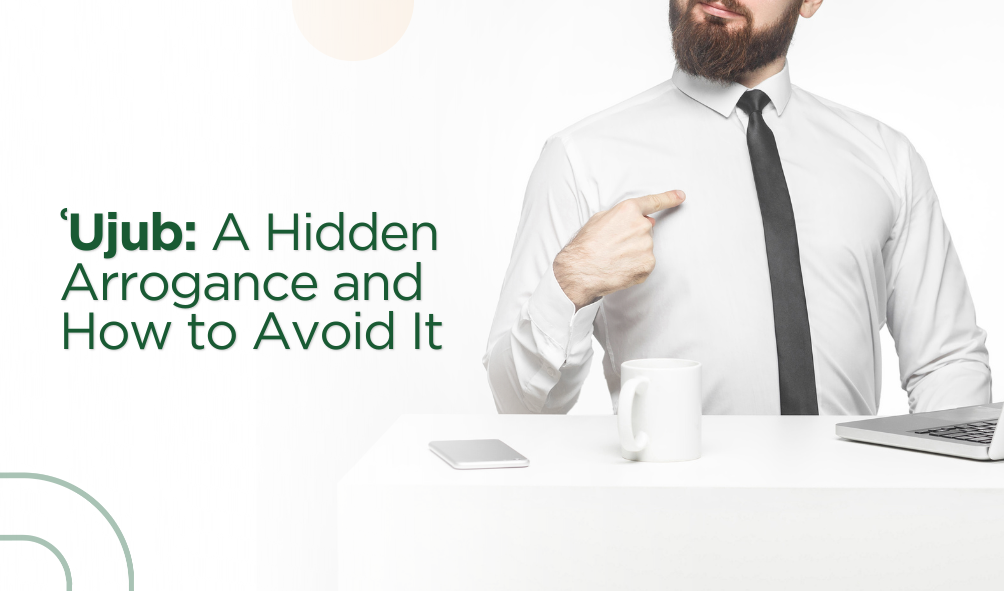Ujub: A Hidden Arrogance and How to Avoid It
One of the subtlest yet most dangerous heart diseases in the journey of faith is ʿujub or self-admiration or conceit. It is the sensation that one is so filled with pride in ones own actions, wisdom or skills that one loses sight of the fact that Allah ﷻ is the source of all praise. In contrast to blatant conceit (takabbur), ʿujub lurks covertly within the heart destroying humility and tainting sincerity. It is a silent demolisher that has the power to transform good deeds into a source of pride rather than humility. Every believer who aspires to genuine sincerity (ikhlas) in worship must be able to identify and cure ʿujub.
Also read: Qarun: A Story of Arrogance and Wealth
The Significance and Peril of Ujub
In Arabic, ʿujub (العُجْب) means to be in awe of or revere something especially oneself. It describes excessive self-satisfaction with ones accomplishments whether in worship, knowledge or material success while forgetting that Allah ﷻ is the one who bestowed all opportunities and abilities according to Islamic spirituality. This differenciate it from other form of arrogance which is Takabbur. Takabbur is manifested externally through ones treatment of others whereas ʿujub develops internally leading one to feel superior more moral or more worthy than his peers. The illusion of self-righteousness is something that the Quran cautions against:
“And they consider their deeds to be good, while they are in fact the losers.”
(Surah Al-Kahf, 18:104)
According to this verse people who act in ways that they believe will please Allah ﷻ but whose reward is negated by pride and self-admiration. The true source of success Allah ﷻ Himself is blinded by such concealed arrogance.
Also read: Wealth as a Tool, Not a Goal in Islam
The Manifestation of Ujub
Ujub can take many different forms. It’s possible for a scholar to take pride in his knowledge and forget that wisdom is a gift rather than a feat. He may become so enamored with his prayers or fasting that he forgets Allah ﷻ is the source of his very strength to worship. Even though wealth is only a trust from his Lord a wealthy person may feel superior as a result of it. If activists preachers and philanthropists begin to think that their good deeds are solely the result of their own virtue they may also fall into ʿujub. Its subtlety is what makes it dangerous. In contrast to obvious sins ʿujub poses as righteousness. It is possible to say Alhamdulillah but in reality one feels pride rather than thankfulness. Early academics once claimed that ʿujub was worse than sin because the self-assured person believes he is perfect and does not need to repent whereas the sinner knows he is wrong and asks for forgiveness.
Also read: Unlock Fasting Benefits, Avoid Zero Reward
ʿUjubs Effects on the Soul
The heart is impacted by ʿujub disease in multiple ways. Self-deception is encouraged leading one to overestimate their own virtues and underestimate others. It causes spiritual stagnation because the individual believes he has already attained the pinnacle of righteousness. Acts of worship are destroyed because they turn into platforms for self-promotion rather than devotion. Over time it develops into takabbur or open arrogance which was the sin that ultimately brought about Ibliss overthrow. What the Prophet ﷺ said:
“Whoever has an atom’s weight of arrogance in his heart will not enter Paradise.”
(Muslim, 91)
While ʿujub is not the same as arrogance it is frequently the root of it. Both result from overestimating oneself and losing sight of ones reliance on Allah ﷻ.
Also read: Maximizing Rewards from Worship According to Personal Capacity
How to Stay Away from Ujub
Realizing that Allah ﷻ alone is the source of all success and goodness is the first step in avoiding ʿujub. Each act of worship achievement or gift is a gift rather than a feat of self-actualization. The Quran reminds us:
“And whatever blessing you have — it is from Allah.” (Surah An-Nahl, 16:53).
When this truth is fully internalized self-glorification is no longer an option. The heart is trained to express humility instead of self-praise and thankfulness instead of pride. Additionally a believer needs to regularly examine his flaws and shortcomings. Recalling ones transgressions and frailty stops the ego from growing.
Muhasabah or constant self-evaluation keeps the heart rooted by serving as a reminder that Allah ﷻ alone is the only one who can be perfect regardless of how much good one does. This contemplation cultivates humility and the understanding that without Allah ﷻs mercy ones actions are never sufficient.
A further crucial step is to reaffirm sincerity (ikhlas) prior to during and following each action. By refocusing the intention back on Allah ﷻ the believer can purify his heart from pursuing admiration by asking himself: “Am I doing this for Allah ﷻs sake or for recognition?” Peace results from sincere worship whereas spiritual decay is caused by self-admiration.
It is also a potent reminder to consider the Quranic fate of the conceited. Even the affluent and intelligent can become blinded by pride as demonstrated by the stories of Qarun, Pharaoh and Iblis. Their failure to accept that Allah ﷻ was the source of their success was what ultimately brought them to ruin not a lack of talent. Thinking back on these tales increases thankfulness and humility.
Lastly continuously ask Allah ﷻ for assistance through dua. Such supplication serves as a reminder that true strength comes from relying on Allah ﷻ and a barrier against the murmurs of pride. When someone understands that regardless of his knowledge or piety he would be lost without divine guidance humility grows.
In Conclusion
Ujub is one of the most dangerous spiritual diseases. Gratitude becomes self-praise and worship becomes self-worship. Being humble and remembering that Allah ﷻ is the source of all good and all strength is His alone is the key to avoiding it. While a believer suffering from ʿujub praises himself a humble believer thanks Allah ﷻ for guidance. Thinking oneself righteous is not true piety rather it is a constant fear of Allah ﷻ repentance and an effort to be sincere. Those who are arrogant may despise others but those who are ſujub are blind to their own shortcomings. The remedy consists of awareness repentance and thankfulness because every success is a gift from Allah ﷻ rather than a personal victory and every blessing is a trust.
Let’s Visit, Zeed and join for halal investment with Zeed.

References
- Al-Muhtada. (2025). ʿUjub in Islam: The hidden arrogance you must avoid. Retrieved from https://almuhtada.org/2025/09/28/ujub-in-islam-the-hidden-arrogance-you-must-avoid/
- IslamWeb. (n.d.). داء العجب. Retrieved from https://islamweb.net/ar/article/10237/%D8%AF%D8%A7%D8%A1-%D8%A7%D9%84%D8%B9%D8%AC%D8%A8
- IslamQA. (n.d.). كيف يتخلص من العجب. Retrieved from https://islamqa.info/ar/answers/118095/%D9%83%D9%8A%D9%81-%D9%8A%D8%AA%D8%AE%D9%84%D8%B5-%D9%85%D9%86-%D8%A7%D9%84%D8%B9%D8%AC%D8%A8
- Noor-e-Sunnat Blog. (n.d.). Spiritual ailments and their remedies: Pride or Takabbur. Retrieved from https://blog.nooresunnat.com/spiritual-ailments-and-their-remedies/pride-or-takabbur/







